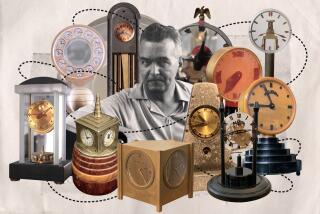JAZZ ARTIST ALLISON MAKES PERFORMING A PRIORITY
- Share via
SAN DIEGO — Ask jazz fans who Mose Allison is and you’ll be told he’s one of the greatest living jazz pianists around.
His best work, they’ll tell you, came in the late 1950s, when he successfully bridged the blues of Sonny Boy Williamson and Tampa Red with the “cool” be-bop of Stan Getz and Zoot Sims.
Ask that same question of rock fans, however, and you’ll hear a different story: Mose Allison is a talented composer whose finest hour was in the 1960s, when he wrote a string of bluesy rock classics for such seminal artists as the Who (“A Young Man Blues”), the Yardbirds (“I’m Not Talkin’ ”), and John Mayall (“Parchman Farm”).
But if you ask Mose Allison himself, he’ll chuckle wryly and simply say he’s a “singer-songwriter” whose preferred instrument is the piano rather than the guitar and whose chosen idioms are jazz and blues instead of folk and pop.
And, the 58-year-old Allison maintains, his real glory days are not the ‘50s or the ‘60s, but the present--a period when he’s more concerned with performing live than cutting records or writing songs.
“I’m always touring, and as long as I’m physically able to do that, performing live will continue to be my main concern,” Allison said by phone from the same Long Island home he’s lived in for the last quarter-century.
“I’ve made records, because I had to for a variety of reasons, and I’ve written songs because my best shot at making money is if other people do my songs.
“But I get more out of a live performance than anything else, and I think the same holds true for my audience.”
Indeed, Allison’s schedule seems to underscore that point. Before he starts a two-week stint Wednesday at Elario’s in La Jolla, Allison spent several weeks in Europe, playing clubs in London, Dublin and Amsterdam.
And upon his return to New York in mid-April, Allison says, he plans on playing more club dates in and around his hometown before making one of his all-too-infrequent returns to the recording studio to cut his first new album in more than four years.
“I regard myself not just as a musician, but as a musician who puts on shows, who gives the audience a solid hour’s worth of entertainment,” Allison said.
“And when I’m up on stage, I’m able to do a little bit of everything I’ve done in more than 30 years in the business: I play jazz, I sing the blues, and I perform a lot of my own songs.”
Born in the small town of Tippo, Miss., Allison began playing piano at the age of 6 and played in a variety of blues bands throughout high school and college.
After graduating from Louisiana State University with a bachelor’s degree in English, Allison decided to make music his career, and for several years he played various honky-tonks, roadhouses and nightclubs throughout the South.
When the be-bop scene began developing in New York in the late 1950s, Allison dutifully moved north, and before long he was blending the simplicity of his country blues roots with the modernist harmonies of jazz stylists like Getz, Sims, Gerry Mulligan and Al Cohn.
He began to sing in 1957, and soon landed his first recording contract with Prestige Records, for whom he recorded what remains his best-known work, a collection of impressionistic vignettes titled “The Back Country Suite (Mose Allison).”
In later years, he developed an understated, somewhat laconic songwriting style that quickly won favor with such early British rhythm-and-blues pioneers as the Who, the Yardbirds and Georgie Fame.
At the same time, he began to win growing acclaim in jazz circles for his modified be-bop style of piano playing, which has always been tempered by his early blues influences.
Allison has recorded more than 20 albums for such major labels as Columbia, Atlantic and Elektra. And his continuing popularity as a recording artist is attested to by the fact that many of his early albums have since been reissued.
Today, however, he is primarily a live artist, although his songs continue to be recorded by contemporary acts ranging from punk-rock leaders the Clash (“Look Here”) to veteran “folkie” Van Morrison (“If You Only Knew”). And, Allison insists, that’s all right with him.
“Like I said, performing live is my main consideration,” he said. “But I always feel good when some band decides to record one of my songs.
“At this point in my career, anything you can get helps you to survive.”
More to Read
The biggest entertainment stories
Get our big stories about Hollywood, film, television, music, arts, culture and more right in your inbox as soon as they publish.
You may occasionally receive promotional content from the Los Angeles Times.










